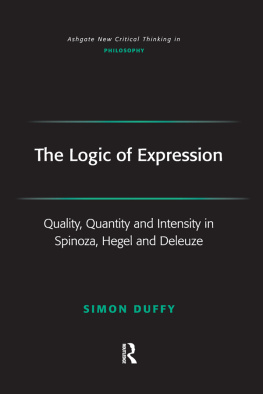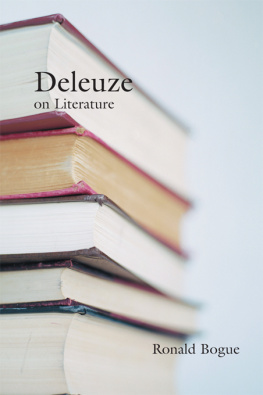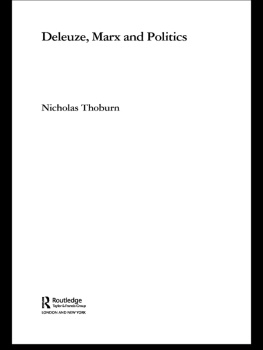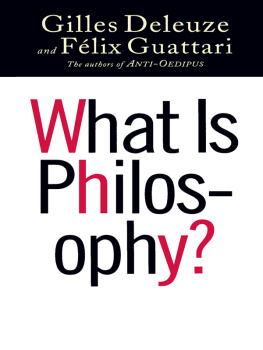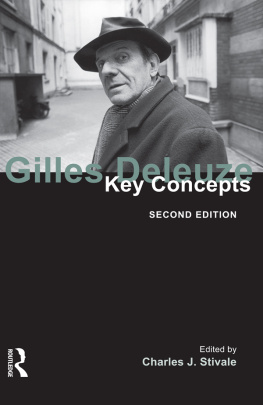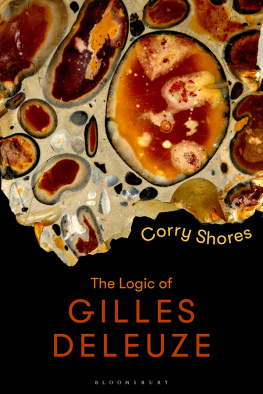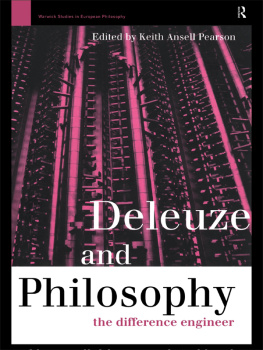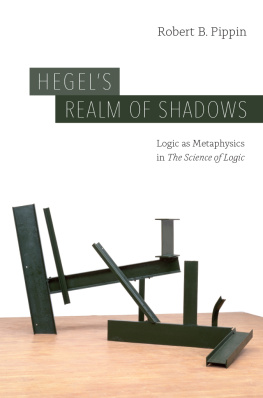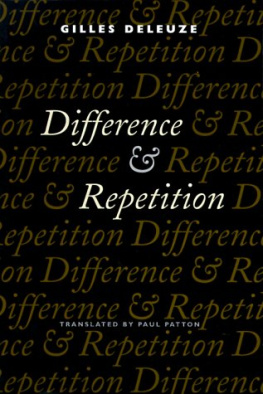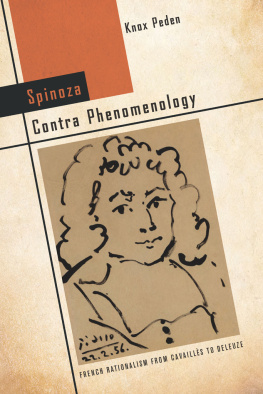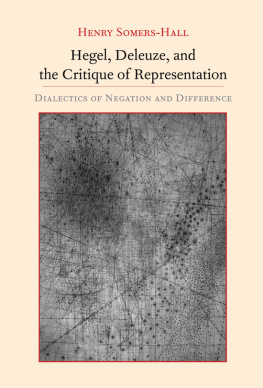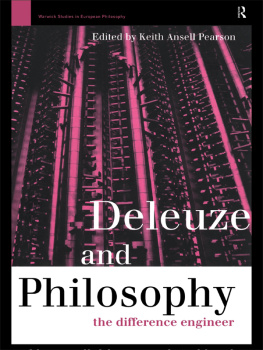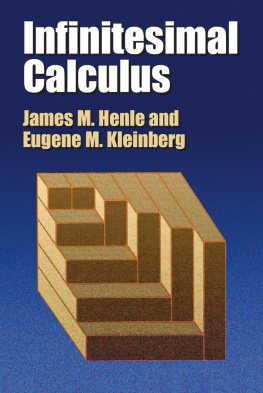THE LOGIC OF EXPRESSION
Engaging with the challenging and controversial reading of Spinoza presented by Gilles Deleuze in Expressionism in Philosophy (1968), this book focuses on Deleuzes redeployment of Spinozist concepts within the context of his own philosophical project of constructing a philosophy of difference as an alternative to the Hegelian dialectical philosophy.
Duffy demonstrates that a thorough understanding of Deleuzes Spinozism is necessary in order to fully engage with Deleuzes philosophy of difference.
ASHGATE NEW CRITICAL THINKING IN PHILOSOPHY
The Ashgate New Critical Thinking in Philosophy series brings high quality research monograph publishing into focus for authors, the international library market, and student, academic and research readers. Headed by an international editorial advisory board of acclaimed scholars from across the philosophical spectrum, this monograph series presents cutting-edge research from established as well as exciting new authors in the field. Spanning the breadth of philosophy and related disciplinary and interdisciplinary perspectives Ashgate New Critical Thinking in Philosophy takes contemporary philosophical research into new directions and debate.
Series Editorial Board:
David Cooper, University of Durham, UK
Peter Lipton, University of Cambridge, UK
Sean Sayers, University of Kent at Canterbury, UK
Simon Critchley, New School, USA and University of Essex, UK.
Simon Glendinning, University of Reading, UK
Paul Helm, Kings College, University of London, UK
David Lamb, University of Birmingham, UK
John Post, Vanderbilt University, Nashville, USA
Alan Goldman, University of Miami, Florida, USA
Joseph Friggieri, University of Malta, Malta
Graham Priest, University of Melbourne, Australia and
University of St Andrews, UK
Moira Gatens, University of Sydney, Australia
Alan Musgrave, University of Otago, New Zealand
The Logic of Expression
Quality, Quantity and Intensity in Spinoza, Hegel and Deleuze
SIMON DUFFY
University of Sydney, Australia
First published 2006 by Ashgate Publishing
Published 2016 by Routledge
2 Park Square, Milton Park, Abingdon, Oxon OX14 4RN
711 Third Avenue, New York, NY 10017, USA
Routledge is an imprint of the Taylor & Francis Group, an informa business
Copyright Simon Duffy 2006
Simon Duffy has asserted his moral right under the Copyright, Designs and Patents Act, 1988, to be identified as the author of this work.
All rights reserved. No part of this book may be reprinted or reproduced or utilised in any form or by any electronic, mechanical, or other means, now known or hereafter invented, including photocopying and recording, or in any information storage or retrieval system, without permission in writing from the publishers.
Notice:
Product or corporate names may be trademarks or registered trademarks, and are used only for identification and explanation without intent to infringe.
British Library Cataloguing in Publication Data
Duffy, Simon
The logic of expression: quality, quantity and intensity in Spinoza, Hegel and Deleuze. (Ashgate new critical thinking in philosophy) 1.Spinoza, Benedictus de, 16321677 2.Deleuze, Gilles 3.Hegel, Georg Wilhelm Friedrich, 17701831 4.Expression (Philosophy) 5.Logic 6.Philosophy History
I. Title
121.68
Library of Congress Cataloging-in-Publication Data
Duffy, Simon.
The logic of expression: quality, quantity, and intensity in Spinoza, Hegel, and Deleuze / Simon Duffy.
p. cm. (Ashgate new critical thinking in philosophy)
Includes bibliographical references and index.
ISBN 0-7546-5618-7 (hardcover: alk. paper)
1. Spinoza, Benedictus de, 16321677. 2. Expression. 3. Deleuze, Gilles. 4. Hegel, Georg Wilhelm Friedrich, 17701831. I. Title. II. Series.
B3999.E9D84 2006
190dc22
2006008837
ISBN 13: 978-0-7546-5618-0 (hbk)
To Lizzy, Patrick, Oliver, Gus & Harriet
and in memory of Stephen Delmore Foster
Contents
I would like to thank the following institutions for facilitating the research that has gone into this book: the Centre for the History of European Discourses at the University of Queensland; the Department of Philosophy at the University of Sydney; The New School Postgraduate Research Center, New York; and the Department of Philosophy at the University of Paris X-Nanterre.
In relation to the research that went in to producing the book, Id like to thank in particular Etienne Balibar, for imparting a wider appreciation of the discipline of philosophy; Paul Patton, for his invaluable suggestions of possible directions to take in my research; Dan Smith, for sharing his expertise in the field of Deleuze studies; and Moira Gatens, both for sharing her expertise in the field of Spinoza studies, and for her support and generosity while I have been working on this project.
In the Department of Philosophy at the University of Sydney, Id like to thank Paul Redding, for his comments on the earlier drafts of my engagement with Hegel; and, in the Department of French Studies, Ross Steele, for his generous assistance and support during my language studies.
I am indebted to Brooke, Gustavo and Lucianna Fasani for their generous support during my stay in New York while preparing the final chapters of the book; and also to Eli King and Robin Auchincloss, and to Jo Gould, James and Stephen Anspacher.
Those friends and colleagues who have been supportive, or provided commentary, and relief, at the different stages of the writing process, have been instrumental to the completion of this project. I would like to thank in particular: Dechen and Vincent Bejon, Lucianne and Ruby Brady, Ada Meinch, Rachel Ann Wood, Greg Johnston, Alex Squire, Peta Mcdowell, Nicholas van Stom, Maren Goerdel, Phil Young, Justine McGill, Yuji Sone, Nicola OShea, Sean Bowden, David Curtin and Sandra Field. A special mention also to my family, without whose support the undertaking of this project would not have been possible.
Parts of appear in the article The differential point of view of the infinitesimal calculus in Spinoza, Leibniz and Deleuze published in the Journal of the British Society for Phenomenology (forthcoming, 2006). I gratefully acknowledge the permission of the editors of the JBSP to republish this material.
Introduction
Spinoza and the problem of expression
The reading of Spinoza that Gilles Deleuze presents in Expressionism in Philosophy What is proposed therefore is a Deleuzian reading of Expressionism in Philosophy that positions itself within the trajectory of the development of Deleuzes philosophy.
Deleuzes reading of Spinoza is explicated within the context of contemporary French Spinoza studies, particularly in relation to the work of Martial Gueroult and Pierre Macherey. However, it is in relation to Hegels interpretation of Spinoza and the position that Hegel assigns to Spinoza in both the dialectical progression of the history of philosophy and the development of his dialectical logic that Deleuze strategically redeploys Spinoza. The process of actualization determined by the Hegelian dialectical logic in relation to the history of philosophy is determinately linear and progressive, insofar as it is predominantly preoccupied with overcoming moments of discontinuity, an example of which would be the system of the philosophy of Spinoza, each of which is at the centre of the necessity of an evolutionary process, which determines the continuation of history.

